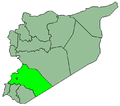Halboun
 From Wikipedia the free encyclopedia
From Wikipedia the free encyclopedia
Halboun حلبون Halbun | |
|---|---|
Village | |
 Halboun | |
| Coordinates: 33°40′N 36°15′E / 33.667°N 36.250°E | |
| Country | |
| Governorate | Rif Dimashq |
| District | al-Tall |
| Subdistrict | al-Tall |
| Population (2004 census)[1] | |
• Total | 6,521 |
| Time zone | UTC+2 (EET) |
| • Summer (DST) | UTC+3 (EEST) |
Halboun or Halbun (Arabic: حلبون) is a Syrian village in the Al-Tall District of the Rif Dimashq Governorate. According to the Syria Central Bureau of Statistics (CBS), Halboun had a population of 6,521 in the 2004 census.[1] Its inhabitants are predominantly Sunni Muslims.[2]
History
[edit]Halboun, which was mentioned as Chalybon (Greek: Χαλυβάν) by Ptolemy and Strabo, was famous for its fine wine, in which it was considered as a luxury to the Persian kings in the Eber-Nari satrapy of the Achaemenid Empire.[3]
There are several Roman ruins found in Halboun, most famously the inscriptions which date back to the reign of Herod Agrippa II.[4]
References
[edit]- ^ a b General Census of Population and Housing 2004. Syria Central Bureau of Statistics (CBS). Rif Dimashq Governorate. (in Arabic)
- ^ Smith, in Robinson and Smith, 1841, vol 3, 2nd appendix, p. 172
- ^ "Helbon". Biblical Cyclopedia.
- ^ "Halboun - حلبون". Directorate-General of Antiquities and Museums (in Arabic). 26 March 2018.
Bibliography
[edit]


